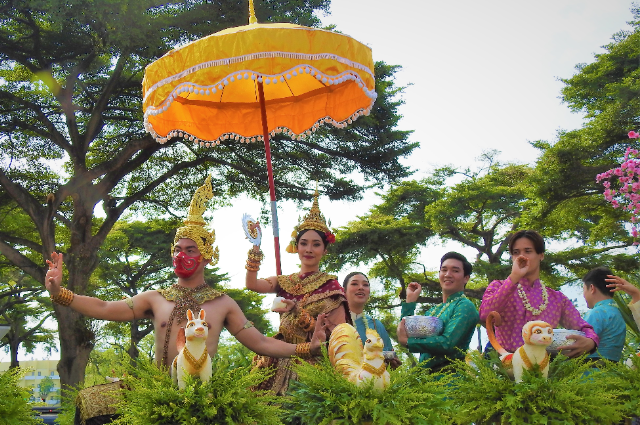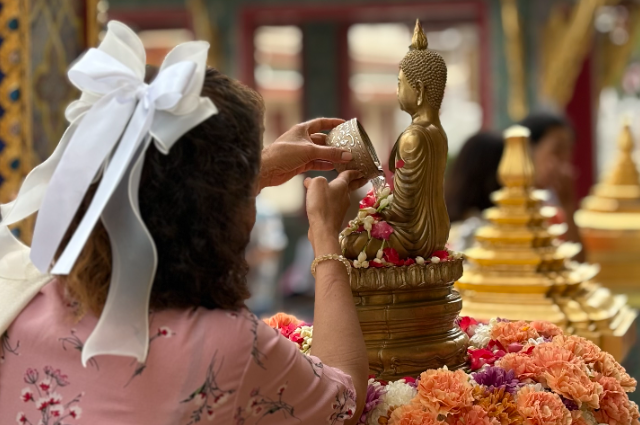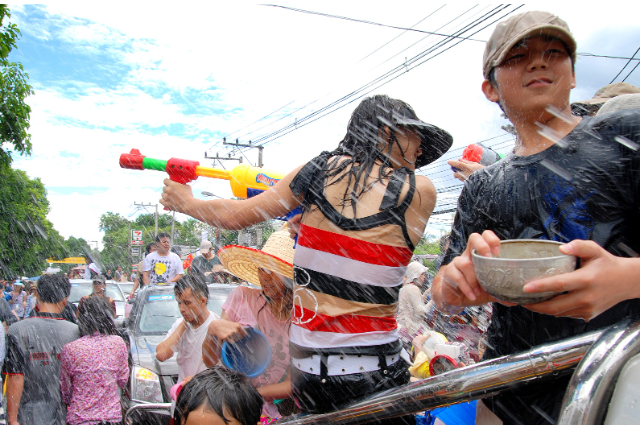Origin and Historical Significance of Songkran
Songkran, Thailand’s most famous and vibrant festival, marks the beginning of the Thai New Year and is deeply rooted in history, religion, and culture. The term "Songkran" originates from the Sanskrit word saṃkrānti, meaning "movement" or "astrological passage," reflecting the sun's transition from one zodiac sign to another. Traditionally, it symbolizes the end of the dry season and the start of a new year with hope, cleansing, and renewal. The origins of Songkran can be traced back to ancient Indian and Hindu influences, where solar movements were used to determine the New Year. As Buddhism spread throughout Southeast Asia, these solar New Year traditions were integrated with local beliefs. In Thailand, the Songkran festival merged with Buddhist teachings, particularly those emphasizing respect for elders, merit-making, and the concept of cleansing away past misdeeds.
Historically, Songkran was celebrated with simple and respectful rituals. One of the earliest and most important traditions was the gentle pouring of water over Buddha statues, monks, and the hands of elders. This act symbolized purification, the washing away of bad luck and sins, and the beginning of a fresh start. People also cleaned their homes, visited temples, and offered food to monks, believing that these acts would bring blessings in the coming year.
In the past, Songkran was also a time for families to reunite, express gratitude to elders, and honor deceased ancestors. The younger generation would respectfully pour scented water over the hands of their elders to seek blessings and good fortune.
Over the centuries, while the spirit of Songkran has remained rooted in tradition, the way it is celebrated has evolved. Today, the festival is best known for its massive and joyful public water fights, where people splash water on one another as a symbol of fun, cleansing, and goodwill. Despite this modern twist, many Thai people still maintain the religious and cultural aspects by visiting temples and performing traditional rituals.
In essence, the historical significance of Songkran lies in its celebration of renewal, family, and spiritual reflection. It is a time to let go of the past, embrace the present with joy, and welcome the future with positivity—making it one of the most meaningful and cherished festivals in Thailand.
Traditional Customs and Rituals:
Songkran, the Thai New Year festival, is deeply rooted in customs that emphasize respect, family values, and spiritual renewal. One of the most well-known traditions is the gentle pouring of water over the hands of elders, monks, and Buddha statues. This act symbolizes washing away bad luck and welcoming a fresh start. Many people visit temples to pray, offer food to monks, and perform merit-making activities to bring good fortune for the year ahead. Homes are thoroughly cleaned before the festival to sweep away bad energy, and sand is brought to temples to create symbolic pagodas, known as “chedi sai,” which represent the restoration of soil carried away on people’s feet over the year.
Family plays a central role during Songkran. Traditionally, people travel back to their hometowns to spend time with their families and show respect to their older relatives. A special ritual called Rod Nam Dam Hua involves younger family members pouring fragrant water over the palms of elders while offering words of blessing and apology. In return, the elders give their blessings for happiness and success. This act of humility and gratitude reflects the Thai values of respect and kindness. While modern celebrations often focus on large public water fights and street parties, these traditional rituals remain an important part of Songkran, especially in rural areas. They remind everyone that beyond the fun, Songkran is a time of reflection, renewal, and reconnection with cultural and spiritual roots.
Modern-day Celebrations:
In today’s Thailand, Songkran is widely recognized for its vibrant and joyful public celebrations, which blend traditional practices with lively, modern activities. The most iconic feature of modern Songkran is the large-scale water fights that take place in streets across the country. Equipped with water guns, buckets, and even hoses, people of all ages participate in playful water battles that symbolize cleansing, renewal, and the washing away of misfortune. Popular cities like Bangkok, Chiang Mai, and Pattaya become festival hubs, attracting both locals and tourists who gather to enjoy the fun, music, and dancing in the streets. These celebrations often last for several days, turning entire neighborhoods into wet and wild zones of happiness.
Alongside the water activities, modern Songkran also includes cultural events, beauty pageants, traditional Thai dance performances, and parades that showcase Thailand’s heritage. Many businesses and schools close during the festival, giving families time to travel, reunite, and participate in both traditional and modern festivities. Although the playful water fights dominate the public image of Songkran, many people still begin the day with temple visits and respectful rituals, blending the old and the new. For tourists, Songkran offers a unique chance to experience Thai hospitality and joyful spirit up close. However, in recent years, there has also been growing awareness around celebrating responsibly—using water wisely, staying safe, and preserving the deeper meaning behind the festivities. Overall, modern-day Songkran is a beautiful mix of fun, tradition, and national pride.
Cultural Symbolism and Importance:
Songkran is much more than just a water fight—it holds deep cultural and spiritual meaning for Thai people. At its heart, Songkran symbolizes cleansing, renewal, and the beginning of a new chapter. Water, the central element of the festival, represents purification. Sprinkling or pouring water is believed to wash away misfortune, sins, and negative energy from the past year, allowing individuals to start fresh with good luck and blessings.
Beyond its spiritual significance, Songkran also highlights core Thai values such as respect for elders, family bonding, and community unity. The traditional practice of Rod Nam Dam Hua, where younger people pour water over the hands of elders, is a beautiful way of showing gratitude, seeking forgiveness, and receiving blessings. Visiting temples, making merit, and giving alms to monks reflect the importance of religion in daily life. These rituals not only honor Buddhist beliefs but also strengthen the sense of belonging and cultural pride among the Thai people. Even with the modern, playful celebrations, these deeper meanings remain central. Songkran is a time when traditions and joy come together, reminding people of their roots, values, and the importance of starting each year with kindness and positivity.
Songkran and Thai identity:
Songkran is more than just a national holiday—it is a powerful expression of Thai identity and cultural pride. The festival reflects many key values of Thai society, such as respect for elders, strong family ties, joyfulness, and spiritual mindfulness. Through its unique mix of traditional rituals and modern festivities, Songkran allows Thai people to connect with their heritage while celebrating the present.
The customs practiced during Songkran—like visiting temples, performing merit-making, and the gentle pouring of water—highlight the importance of Buddhism in Thai life. These acts show how closely religion and daily life are tied together in Thailand. At the same time, the fun and friendliness of the public water fights reveal the warm, welcoming, and playful nature often associated with Thai people. During Songkran, community bonds are strengthened as families reunite and neighbors come together in celebration.
For many, Songkran is a moment of national unity, where cultural identity is proudly displayed and passed on to younger generations. Even as modern influences continue to shape the festival, its heart remains strongly Thai. In this way, Songkran helps preserve Thai traditions while allowing room for joyful, inclusive celebration—making it a meaningful symbol of what it means to be Thai.
Impact on Tourism and Economy:
Songkran is not only a cultural and religious celebration but also one of Thailand’s biggest economic drivers, especially in the tourism sector. Every year, the festival draws millions of tourists from around the world who travel to Thailand specifically to experience the excitement and cultural richness of Songkran. Major cities like Bangkok, Chiang Mai, and Phuket have become tourism hotspots, with hotels, restaurants, and travel services experiencing a major boost in business. Airlines and public transportation services also see a rise in demand, and local vendors benefit from increased sales of water guns, festival clothing, and street food. The Thai government and tourism authorities actively promote Songkran internationally, recognizing its potential to generate revenue and showcase Thai culture on a global stage.
However, the economic impact extends beyond just tourism. The festival also supports local economies, especially in smaller towns and rural areas, where traditional celebrations attract both locals and domestic travelers. Businesses often see increased activity during this time, and many seasonal jobs are created to meet the high demand. That said, managing the festival also comes with costs, such as organizing public events, ensuring safety, and addressing environmental concerns like water usage and waste. Still, the overall economic benefits of Songkran are significant, making it not only a time of cultural celebration but also a major contributor to Thailand’s economy. With a balance between tradition, fun, and smart planning, Songkran continues to be both meaningful and economically beneficial.
Environmental and Social Considerations:
While Songkran is a joyful and important festival, it also brings certain environmental challenges. The large-scale use of water, especially in cities during public celebrations, has raised concerns about water wastage, particularly during times of drought. In recent years, the Thai government and environmental groups have encouraged more responsible water use—promoting shorter celebrations, using clean recycled water, and limiting water fights to specific areas. Additionally, the increase in plastic waste from water guns, buckets, and food packaging during the festival has become a growing issue. Efforts are now being made to promote eco-friendly alternatives, such as reusable containers and biodegradable materials.
On the social side, Songkran fosters strong community bonds and family reunions. However, the rise in road accidents during the festival—often due to reckless driving and alcohol consumption—has become a major concern. Authorities launch awareness campaigns and set up safety checkpoints to reduce fatalities and promote responsible behavior. Moreover, as Songkran becomes more commercialized and tourist-driven, some worry that its traditional meaning is getting lost. To balance fun and tradition, communities are working to preserve the cultural essence of the festival while still welcoming visitors. Responsible celebration ensures that Songkran remains safe, meaningful, and respectful to all.
Overview:
Songkran is a vibrant celebration that beautifully blends Thailand’s deep-rooted traditions with joyful, modern festivities. More than just a water fight, it reflects the values of respect, renewal, and unity that are central to Thai culture. While it brings significant benefits to tourism and the economy, it also reminds us of the importance of celebrating responsibly—both environmentally and socially. As Thailand continues to evolve, Songkran remains a powerful symbol of national identity, cultural pride, and community spirit. It’s a time when old and new come together, and the spirit of Thailand shines through in every drop of water.



